Turkey Deepens Strategic and Economic Ties Across Africa Amid Global Power Shifts
 tr-africa
tr-africa
Turkey’s growing footprint in Africa marks a major shift in its global engagement strategy, as Ankara transitions from a Eurocentric focus to a wider global investment approach, particularly across emerging markets in Africa, Asia, and the Middle East.
While Turkey’s official Africa opening strategy dates back to 1998, its true acceleration began in 2003. Two decades later, the results are clear: economic, diplomatic, and cultural relations with Africa have reached historic highs.
Turkish FDI Surges with Strategic Projects Across the Continent
According to fDi Markets, direct investments from Turkish companies in Africa reached a record 23 projects in 2024, up from 20 in 2023. These greenfield ventures range from:
-
Textile manufacturing in Egypt
-
Medical device facilities in Nigeria
-
Solar parks in Zambia
-
Karpowership’s $1 billion floating LNG power plant in Mozambique
Turkey is now Africa’s eighth-largest source of greenfield FDI by value, surpassing Germany, India, and Switzerland, and trailing only behind giants like the U.S. and China.
Trade Volumes and Construction Contracts Reach New Heights
Trade between Turkey and Africa has expanded dramatically—from $5.4 billion in 2003 to over $40.7 billion in 2022, according to Turkey’s Foreign Economic Relations Board (DEİK). The continent has also been a major market for Turkish defense and construction firms:
-
Turkish contractors completed 1,864 projects worth $85 billion by the end of 2022.
-
Key sectors include energy, infrastructure, and textiles, often focused on meeting humanitarian needs, as emphasized by DEİK’s Fatih Yücel.
FDI as a Strategic Tool for Global Value Chain Integration
Turkey’s outward investment strategy is increasingly seen as a means to enhance global economic connectivity, not just profit generation. Yücel argues that countries like Turkey must engage internationally via commercial and cultural diplomacy, especially in value-added sectors.
“We see FDI as a strategic tool,” Yücel said, adding that Turkey’s manufacturing strength and geographic location make it an appealing alternative to both China and the U.S. for African states seeking diversification.
Cultural Diplomacy and Soft Power Expansion
Cultural engagement is another pillar of Turkey’s Africa outreach. The Yunus Emre Institute, a state-backed cultural organization, has expanded its presence in Africa, promoting Turkish language, arts, and heritage. In 2024, the Institute launched its first Turkish course in Bujumbura, the economic capital of Burundi.
Ankara Seeks Middle Power Status Amid Global Unrest
As global conflicts and Western aid reductions create geopolitical gaps, Turkey is increasingly positioning itself as a “middle power”. According to Natasha Lindstaedt, professor of government at the University of Essex, Turkey has capitalized on international crises, including the Syrian war and Russia’s invasion of Ukraine, to expand its influence.
“They’re open to trade with anyone. Unlike Western powers, Turkey engages without imposing political conditions,” she noted, comparing Turkey’s approach to China’s non-interventionist trade diplomacy.
Diplomatic Outreach Reflects Global Ambitions
According to the Lowy Institute, Turkey now has the third-largest network of diplomatic missions worldwide, trailing only the U.S. and China. While still Eurocentric, many new embassies and consulates have opened in Africa and the Middle East, often supporting Turkish businesses entering those markets.
“Ankara’s diplomatic push is part of its ambition to become a global power in its own right,” said Ryan Neelam of the Lowy Institute. He noted that these outposts serve a dual role—facilitating political relations and supporting corporate expansion.
Challenges Remain Amid Domestic Political Tensions
Despite Ankara’s international momentum, Turkey’s domestic political climate presents complications. President Erdoğan’s growing authoritarianism has strained relations with NATO and further dimmed prospects of EU accession, potentially complicating long-term diplomatic and trade alignments.


